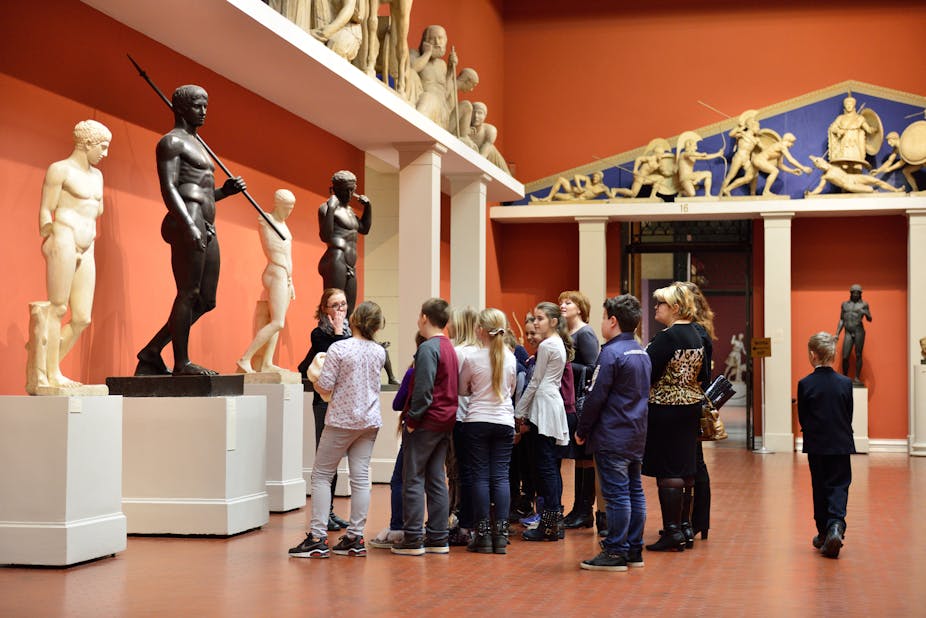The national history curriculum in Australia is under “review” by the conservative government. Those reviewing the curriculum have criticised what our kids learn in history class, saying there isn’t enough of a focus on our “Judeo-Christian”, Western roots.
How history is taught in schools is often the subject of vigorous debate, and not only in Australia. Not because the past is fascinating, complex and ever-changing in its interpretations, but because all too often political, religious and cultural interests hijack studies of the past to present them through an ideological lens.
Of all school subjects, history is the discipline most targeted by politicians. Ideologically based abuse of history education is a global phenomenon.
Conservative politicians often use history education in schools to promote their view of how they see the world. We know this because it happened in the US in the 1980s, in Canada in the 1990s and the early 2000s and in the UK from the early 1980s through to the present day.
How is history taught elsewhere?
Two recent academic collections of studies also show the range of countries and regions where history education remains a vexed issue. These 25 case studies show in detail how conservative forces with nationalistic inclinations have attempted to interfere in how history is taught in schools.
Of these case studies, attempted and actual political interference has been a strong element in recent debates about history education in democratic countries such as Australia, Canada, Spain, Cyprus, England, Israel, Japan, Russia, Turkey and the US. Most of the more intense debates occur in nations with substantial migrant-descent populations such as the Netherlands, in states where immigration debates have turned nasty as in Greece, or in nations with substantial minority populations (Northern Ireland, Canada and Israel). We also have nations where the recent past has left countries with troubled legacies, as in Germany and Russia.
In modern Germany, a nation that has never had a national curriculum, not even under the Nazis, the education authorities in the 16 Länder (states) ensure the Nazi era, the Holocaust and pre-unification national history are focuses. Sylvia Semmet, German president of Euroclio, has argued the Third Reich era is seen by many students and teachers as Nazi overload (it is also studied in other subjects such as language classes, civics and religious education).

The Holocaust is studied carefully with an emphasis on site visits, oral histories, remembrance days, local projects and eyewitness testimonies. Semmet reports that many modern German students, while more aware of the Holocaust than their parents and grandparents, feel disconnected from the events of 1933-1945. Her proposed solution for keeping the memory alive is more curricular emphasis on an “emotional and personal” touch. Overall, though, German schools take their investigative historical responsibilities very seriously.
Russia is a multi-ethnic nation with a highly centralised education system and a century-old history of massive traumas. During the chaos of the Yeltsin-era “Roaring Nineties”, history teaching was freed up to examine pre-soviet and soviet eras with impunity. There was an unprecedented sense of liberation in the education system.
According to ACU’s Associate Professor Joseph Zajda, this investigative freedom has gradually been shut down during the Putin administration. The Russian leader promotes an emphasis on the “bright spots” in Russian history, authorising a pro-Putin single textbook and advocating a return to patriotic values:
We are developing a national ideology that represents the vision of ourselves as a nation, as Russians, a vision of our own identity and of the world around us. Teachers will then be able to incorporate this national ideology, this vision, into their practical work in a normal way and use it to develop a civic and patriotic position.
Conservative interference in history
Globally, it is clear that the rhetoric of these debates centres on common conservative themes. These include a purported crisis of national identity, a belief that history has been taken over by radicals, a dislike of allegedly inappropriate topics and an assertion that history in schools should be a celebratory/commemorative activity as opposed to a structured, open-ended enquiry led by historically literate teachers.
But the annexation of history is not the prerogative of conservative parties. While it is the case that in democratic societies, history education and indoctrination of the kinds described above tend to be a major concern of the nationalistic Right, in totalitarian societies putting history to use as an unashamed agent of indoctrination is a phenomenon of both sides of politics.
However, in Australia, there is no evidence of interference by Labor politicians in history education. Arguably, this is because leftist politicians in Australia (not necessarily paragons of political virtue themselves) have paid little or no attention to using history as an educational tool. Unlike their conservative counterparts, they see education as more a pathway to personal growth within a public school system than as a means of defending the national psyche.
With the creation of the Australian Curriculum in history, to avoid students being subjected to overt or covert in-school propaganda exercises, it is vital that the subject be taught as a non-ideologised, discipline-based, expert-led investigative activity.

